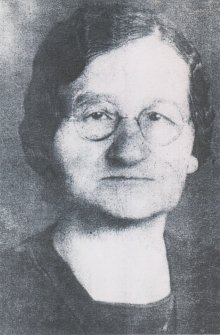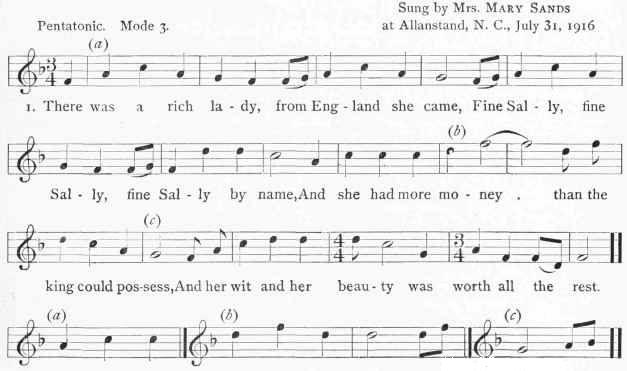Fine Sally- Sands (NC) 1916 Sharp A
[From English Folk Songs from the Southern Appalachians, Vol 2 by Cecil J. Sharp and Maud Karpeles; 1932 edition. My title, Sharp used the generic title, The Brown Girl for all versions, no local titles supplied, his notes follow. Be sure to read "A Nest of Singing Birds: Cecil Sharp, Mary Sands and the Madison County Song Tradition" an article by Mike Yates. Sharp A is from Sands (below) and C is from Mitchell Wallin her half-brother. Both version have, "Then fly from your colour," (next to last line- see footnote) and are probably same source ballads.

Mary Sands
Excerpt from Yates article: "Cecil Sharp first met Mary Sands on Monday, 31 July, 1916, when she arrived at their lodgings shortly after breakfast. Mary, then aged 44, was the mother of nine children. A tenth child, John Wesley Sands, was to arrive on 28 August, less than a month after their meeting. Mary gave Sharp six ballads that day - ‘six first raters’, he called them. These were The Silkmerchant’s Daughter, a version of Pretty Nancy of Yarmouth, which Mary called The Perbadus Lady, The Brown Girl, Lord Bateman, Fair Margaret and Sweet William and Come You People Old and Young, a version of The Suffolk Miracle which Sharp described as ‘curious’.
Mary Sands again called on Sharp the following morning, singing him a further six songs and ballads. Sharp’s diary makes mention of Arise, Arise, You Drowsy Sleepers, The Daemon Lover and Mary’s version of Earl Brand, though not of the other three songs collected that day, The Little Soldier Boy, I Am a Man of Honour, and The Broken Token.
On Wednesday morning, 2nd August, Sharp and Karpeles went to visit Mary Sands at her home, where they collected an ‘interesting’ version of The Golden Glove and The Outlandish Knight. Sharp notes that he ‘gave her 5 dollars with which she was very pleased, though anxious that it should be understood that I was not paying her for the songs’. (Years later, one of Mary’s daughters, who would have been six years old at the time, recalled that Sharp had, in fact, given Mary $50. It seems more likely that it was only $5.)"
This ballad is not to be confused with the popular ballad, Child No. 73 Lord Thomas and Fair Annet, which is commonly known in the US, and Canada as "The Brown Girl."
US and Canada versions are based on the hundreds of late 18th century English broadsides sometimes titled "The Sailor from Dover" or "Sally and her Truelove Billy."
Child's B version of 295, "The Brown, Brown Girl" collected by Rev. S. Baring-Gould, introduced stanzas from the "Sally and her Truelove Billy" songs. In his article "Folk Song Tradition, Revival and Re-Creation" Steve Gardham has shown that Baring-Gould's ballad is a re-creation of two ballads and not traditional.
To put it simply, the versions are not related to "The Brown Girl" but are part of the "The Sailor from Dover" and "Sally and her Truelove Billy" song group. In the US and Canada some common titles are "Pretty Sally," "Sally," and "A Rich Irish Lady." They have been put here following Bronson and others who have attached them to Child 295, not because they belong here.
R. Matteson 2014]
Notes from Cecil Sharp No. 44. The Brown Girl.
Texts without tunes:— Child's English and Scottish Popular Ballads, No. 295. Gavin Greig's Folk-Song of the North-East, i, art. 79. Broadside by Such, 'Sally and her True Love Billy' Cox's Folk Songs of the South, p. 366 (see also further
references). Journal of American Folk-Lore, xxvii. 73 ; xxxii. 502 ; xxxix. 110.
Texts with tunes: — Christie's Traditional Ballad Airs, ii. 241. Kidson's Garland of English Folk Songs, p. 20. Journal of American Folk-Lore, xviii. 295 (tune only). Journal of the Folk-Song Society, viii. 5. British Ballads from Maine, p. 418.
Davis's Traditional Ballads of Virginia, pp. 537 and 604.
'Colours' (Texts A and B) may be a corruption of 'country' as given in Folk Songs of the South.
Version J is reminiscent of The Death of Queen Jane (No. 32).
A. [Fine Sally] The Brown Girl- Sung by Mrs. MARY SANDS at Allanstand, N. C, July 31, 1916; Pentatonic Mode 3.

1. There was rich lady, from England she came,
Fine Sally, fine Sally, fine Sally by name,
And she had more money than the king could possess,
And her wit and her beauty was worth all the rest.
2 There was a poor doctor who lived hard by,
And on this fair damsel he cast his eye.
Fine Sally, fine Sally, fine Sally, says he,
Can you tell me the reason our love can't agree?
I don't hate you, Billy, nor no other man,
But to tell you I love you I never can.
3 Fine Sally took sick and she knew not for why,
And she sent for this young man that she was to deny.
He says: Am I the doctor that you have sent for,
Or am I the young man that you once did deny?
Yes, you are the doctor can kill or can cure
And without your assistance I'm ruined, I'm sure.
4 Fine Sally, fine Sally, fine Sally, says he,
Don't you remember when you slighted me ?
You slighted me highly, you used me with scorn,
And now I reward you for what's passed and gone.
5 What's passed and gone, love, forget and forgive,
And spare me a while longer in this wide world to live.
I don't want you, Sally, in the durance of my breath,
But I'll dance on your grave when you're laid in the earth.
6 Off from her fingers pulled diamond rings three.
Here, take these rings and wear them when you're dancing on me,
Then fly from your colour [1] and be no more seen
When you have done dancing on Sally your queen.
1. country (Sharp's footnote). Sharp A and B have "colour(s)," which should mean "to abandon or go away from your general's ensign (flag)," i.e., to fly from your colours; [from] Latin a, away from, bandum, the general's banner. [Reference: E. Cobham Brewer, 1887); Altered English: Surprising Meanings of Familiar Words - Page 11 by Jeffrey Kacirk.]
However "colors" in this case, does not seem to represent a flag. After an examination of several versions, it seems that the word is "color" usually "colors" and that it means the reddish hue or the color of a living body- when one loses their color, they are dead. When they "fly from their (normal) colors," they are dead and can "no longer be seen."
Barry (JAFL 1914) from a Kansas MS circa 1908:
While dancing o'er Sally, o'er Sally your queen,
And her colors are there, now no more to be seen!"